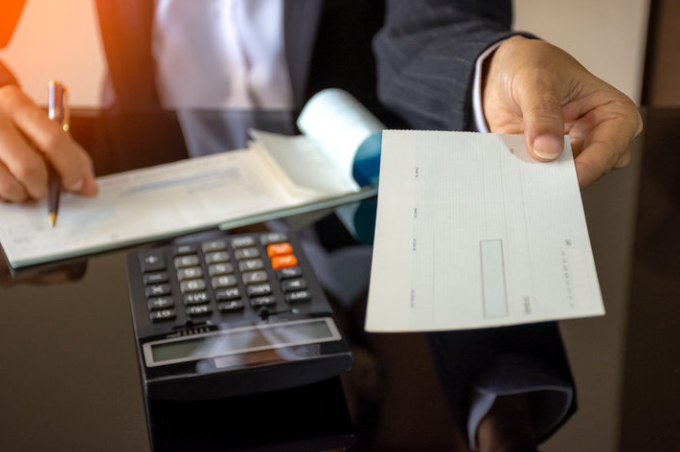10 Best Forex Brokers Accepting Cheques

10 Best Forex Brokers Accepting Cheques comprehensive guide introduces you to Forex brokers who will welcome you to the world of trading with a cheque deposit.
In this in-depth guide, you’ll learn:
- What is a Minimum Cheque Deposit?
- Can I open a Forex account with a Cheque?
- Who is the best forex broker accepting cheques as a deposit?
- Which forex brokers accept Cheque deposits?
- Do Cheque deposit accounts have access to all trading platforms?
So, if you’re ready to go “all in” with forex brokers that accept Cheques to fund their accounts…
Let’s dive right in…
Best Forex Brokers accepting cheques (2024*)
- ☑️ Forex.com – regulated by FCA
- ☑️ IC Markets – regulated by ASIC
- ☑️ FXCM Markets – minimum deposit from $1
- ☑️ FP Markets – Low Forex fees
- ☑️ Forex Time (FXTM) – Segregates client funds
- ☑️ eToro – Regulated by FCA, CySEC, and ASIC
- ☑️ EasyMarkets – Regulated by CySEC and ASIC
- ☑️ FBS – Negative balance protection
- ☑️ IG – Used by 178,000+ traders
- ☑️ HYCM – Regulated by FCA
The Importance of Cheques in the Trading Industry
Despite the rise of electronic payment options, cheques remain a prominent component in trade. Certain traders prefer them due to their established credibility and reliability. Cheques offer unparalleled security and traceability that can be hard to match through other means.
Additionally, for traders who prioritize comprehensive financial documentation, physical cheques provide a tangible account of transactions – particularly those involving big amounts where fund tracking is crucial.
Cheques and Risk Management
Trading necessitates risk management. Cheques are valuable because they present a more secure alternative to carrying large amounts of cash and are less susceptible to cybersecurity threats than some digital methods.
Although it can be advantageous and disadvantageous, the mandatory clearance period for cheques before funds become accessible is an inherent delay.
This can impede trading but also yields room for transactions to be reconsidered or invalidated, establishing an essential safety measure in trading circumstances.
Accessibility and Inclusion
Cheques are crucial in regions or demographics where digital infrastructure is lacking or traditional banking processes are preferred. In numerous global locations, traders may face obstacles with Internet banking access and apprehensions regarding online transactions.
With the availability of cheques as a secure and practical means to conduct business, these traders can operate confidently. This inclusion ensures that the trading market remains accessible to more individuals, increasing its diversity.

Cheques as a Tool for Self-Control
Frequent trading demands significant financial discipline and strategic planning. Issuing cheques, with their tangible form and associated procedures, can encourage more deliberate investing than the effortless digital transfer of money by clicking a button.
By requiring greater effort, such as writing out cheques manually, traders may be inclined towards thoughtful decisions that minimize impulsive high-risk trades in the future.
Cheques and International Trade
Even though they are not the fastest form of payment, cheques hold a distinct position in international trade.
They serve as a widely acknowledged way to conduct cross-border transactions, particularly when dealing with parties from various countries with varying levels of confidence and trust in digital payment systems.
While using cheques for foreign trades, traders should keep informed about processing time delays and potential currency exchange difficulties.
An Equitable View on Cheques
Although cheques may seem outdated in today’s trade world, they still provide value to those who prioritize safety, trackability, financial responsibility, and inclusion.
While the role of cheques may evolve as the industry progresses, their importance in certain market segments cannot be ignored. Traders and brokers alike must understand how cheques are crucial in facilitating various financial transactions within the trading sector.
The minimum cheques deposit requirement at forex brokers can differ significantly depending on the broker’s policies, account type and the currency in which the cheque is.
Pros and Cons of Cheques
| ✅ Pros | ❌ Cons |
| When a cheque is written, money is not taken out of the account right away, which can aid in cash flow management | Handling cheques physically involves writing, mailing, and depositing them, which causes annoyance and delays |
| Cheques are a dependable and recognizable mode of payment for certain traders, particularly those who are used to conventional banking procedures | In volatile markets, the sluggish processing of cheques might cause delays in the reflection of funds in trading accounts |
| Cheques are a widely accepted form of payment in the trading sector because they are accepted by the majority of banks | A cheque can bounce, resulting in delays and maybe costs, if there is not enough money in the account of the issuer |
| Because they have extra security measures and need a signature, cheques provide high protection against fraud. | Some brokers and trading platforms are ceasing to accept cheques due to the popularity of digital payment methods |
| Where transaction limits could constrain other payment options, cheques are a practical option for making large deposits or withdrawals | Paper cheques are susceptible to damage, loss, or theft, which can cause further issues and security concerns |
| When it comes to precise record-keeping and auditing in trading activities, using cheques creates a clear paper trail | For traders who conduct business outside of these hours, the requirement to deposit cheques during banking hours may provide a challenge |
| When processing cheques, particularly for foreign transactions, certain banks and brokers may impose costs | |
For Which Traders Are Cheques Suitable
Traditional Traders
Regarding payment methods, cheques appeal more to conventional and cautious traders. These individuals prioritize security and having a paper trail over convenience or speed of transactions.
The tangible nature of cheques reinforces their sense of control in trading activities, while the legal framework ensures traceability should any issues arise with audits or disputes.
However, these traders must consider processing delays associated with fund clearance when planning their trade approaches for optimal outcomes.
Traders in Areas with Limited Internet Access
Cheques remain a crucial payment method in areas with insufficient or undependable digital banking infrastructure. Due to security apprehensions, traders may not have perpetual access to internet banking facilities.
Opting for cheque transactions proves reliable and reasonable in such situations. Nonetheless, traders must consider potential problems related to the duration it takes for cheque clearance and the accessibility of bank facilities for cheque verification or cashing purposes.
Traders Executing Extensive or Cross-Border Deals
Traders in international business or dealing with large transactions often consider cheques a viable option. Cheques are particularly advisable for high-value deals where cash or digital fraud may be more likely, given their secure features.
Additionally, the universal acceptance of cheques can simplify cross-border transaction procedures.
Nevertheless, such traders should educate themselves on potential challenges related to currency exchange rates and various global banking system regulations that could result in prolonged clearance periods for overseas cheques.

Considerations for Traders Using Cheques
- Because the clearing period of cheques can affect cash flow and trading possibilities, traders should budget for this.
- Cost control requires understanding any fees related to the issuance or deposit of cheques, particularly in foreign operations.
- Traders must be aware of the legal ramifications of giving and receiving cheques. This includes knowing what happens when a cheque bounces and what options are available in the event of fraud.
- Building strong bonds with banks helps facilitate the clearing of cheques more quickly and aids in resolving any problems that may come up.
- Tracking finances and settling disagreements require careful documentation of all cheque transactions.
- It is crucial to put precautions in place to stop cheque fraud, such as using cheques with sophisticated security features and confirming the legitimacy of business partners.
Potential Scenarios for using cheques in trading Forex
Although cheques are not commonly employed in Forex trading due to the market’s fast-paced and unstable nature, they can still be useful under certain circumstances.
The trader’s preferences, geographical location, and transaction size influence their decision on whether or not to use them. In upcoming sections, we will explore several scenarios where using cheques when conducting Forex trades is appropriate.
Geographic Influence and Conventional Traders
In areas where digital banking is not fully integrated or dependable, cheques are still the predominant mode of conducting financial transactions. Traders in these regions who adopt a more traditional approach to their finances rely on cheques to deposit money into their Forex accounts.
This scenario is commonplace in parts of the world where individuals prefer face-to-face interactions as they provide them with greater security and comfort than online dealings.
Substantial Financial Investments
For substantial transactions involving significant amounts of money, traders may opt for cheques due to their inherent security features. Cheques possess the capacity to be traced and create an organized audit trail, making them a favored choice in Forex trading deals with high-value constituents.
The ability to detect potential frauds coupled with impeccable transaction tracking makes cheques a sought-after alternative when routinely carrying out considerable exchange volume.
Professional and Institutional Market Participants
Institutional traders like banks and large firms often opt for cheques due to their entrenched accounting protocols and norms.
These entities usually have stringent financial control parameters, necessitating an auditable record of transactions that aligns with compliance regulations and meticulous documentation. Cheques provide just the kind of verifiable paper trail these organizations need.
Intermediary and Escrow Transactions
When Forex trading involves an escrow service or intermediary, cheques are often favored as payment. They allow transaction control by restricting fund flow until certain conditions are fulfilled.
This becomes particularly significant when broker supervision or involvement from another third party is required to facilitate agreements and contracts.
Traders in Long-Term Positions
Traders who hold positions for an extended period may benefit from using cheques, unlike day traders. The lengthier execution process of utilizing cheques does not hinder their trading approach as they are not concerned with rapid financial transactions.
This method focuses on strategic placement rather than exploiting fleeting market fluctuations and swings.

Considerations Toward Risk Management
Cheques act as a safeguard against impulsive decisions in risk management. The cheque clearance period allows traders to reassess their positions, creating a natural barrier discouraging hasty trading choices.
This can be particularly advantageous for individual traders who wish to implement self-restraint into their investment strategies.
Strategies to mitigate risks involved with using cheques as a payment method
Using cheques as a payment method in Forex trading poses specific risks such as potential fraud, bounced cheques, and delayed transaction times. To mitigate these concerns, it is necessary for traders relying on this payment option to adopt measures aimed at minimizing them.
In the following section, we explore some proven strategies for successfully reducing associated risks when using cheques in Forex trade transactions.
Confirmation and Due Care
Authenticity Establishment
Before accepting a cheque, verify the identity of the person who wrote it and conduct thorough research on their trading partner or organization.
To confirm an individual’s legitimacy, check their identification and previous transactions. For organizations, analyze their reputation in the market and financial stability to ensure authenticity.
Frequent Exchange of Information
To ensure any possible issues, like amount discrepancies or delays in clearance, are quickly detected and resolved, staying in frequent communication with the issuing party while processing cheques is recommended.
Strategies for Financial Management
Allowing for the Transition Period
When managing their finances, traders need to factor in the time it takes for cheques to be cleared. This involves maintaining sufficient funds as a safety net in their trading account so that delays caused by clearance processes do not hamper trading operations.
Increasing the Variety of Payment Options
To mitigate risk, it is advisable to employ diverse payment methods. To ensure efficiency and safety, traders can opt for rapid approaches, such as electronic transfers for some transactions, while simultaneously sticking with cheques for others.
Administrative and Legal Protections
Unambiguous Contracts and Agreements
Ensure that there are explicit contracts or agreements for all cheque transactions. These agreements should clearly outline the transaction’s terms and conditions, including procedures to follow in case of fraud or a bounced cheque.
Remaining Updated with Cheque Laws
It is essential to know the rules and legislation pertaining to cheque transactions. If a disagreement emerges or a cheque bounces, this knowledge can facilitate prompt legal action.
Technology-Based Assistance
Verification of Electronic Cheques
Utilizing technology like electronic cheque verification systems can significantly reduce the likelihood of fraud. These technological advancements can quickly and accurately verify a cheque’s legitimacy before being deposited.
Alerts and Mobile Banking
Real-time updates on cheque transactions can be received using alert systems and mobile banking apps. In case of any abnormalities, traders can take quick action due to this immediate feedback.
Typical Banking Relationships
Building Robust Banking Connections
Developing a favorable rapport with your bank can facilitate faster processing of cheques and provide tailored assistance in case any issues arise during cheque transactions.
Bank Consultation Regarding Foreign Cheques
Speaking to your bank in advance can assist you in comprehending details such as currency conversion rates and international clearing procedures, thereby minimizing the likelihood of unanticipated difficulties involved with foreign transactions.
Conclusion
Finding a forex broker that accepts cheques can be tricky, as many have moved towards electronic payment methods. However, there are still a few brokers out there that accept them.
Ensure the broker is regulated by a trustable authority. This will ensure that your funds are safe and that the broker is operating in a fair and trustable manner.
Fees associated with different brokers need to be compared. Brokers may charge higher fees for processing cheques.
Determine how long it takes for cheques to clear. This can differ depending on the broker and your location.
Use an alternative payment method if possible. Electronic payment methods are more reliable and more convenient than cheques.
If you need a cheque to fund your forex trading account, be sure your research is done and compare different brokers before making a decision.
Faq
Yes, using cheques for Forex trading is generally safe because they provide a high level of security and a clear record of transactions. However, traders should be wary of cheque fraud and only deal with reliable brokers.
Several Forex brokers accept cheques, particularly those that appeal to traditional or cautious traders or operate in areas with few digital payment options, including Interactive Brokers, Saxo Bank, TD Ameritrade, etc. Individual brokers’ payment choices may differ, so it is best to check with them directly.
Cheque clearance times in Forex trading can range from a few days to a week, depending on the broker’s procedures and the banking institutions involved.
Yes, some Forex brokers impose additional costs for processing cheques, particularly for overseas transactions, due to the administrative labor involved.
Yes, many Forex brokers accept cheques for depositing and withdrawing funds from trading accounts. However, policies differ by broker.
Yes, you can halt a cheque payment in Forex trading, but traders must act fast before the cheque is executed, and they may be charged stop payment fees.
In international Forex trading, currency rates can considerably impact cheque payments, perhaps resulting in greater costs or disparities in the projected amount due to rate volatility.
If a cheque is lost or stolen during Forex trading, tell your bank to halt payment and the Forex broker to make alternate arrangements.
Cheques are often less ideal for high-frequency Forex traders since they take longer to process, which might slow down the speed required for frequent trading.

